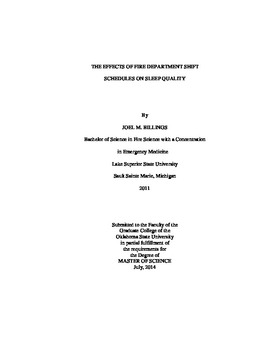| dc.description.abstract | The purpose of this study is to investigate how fire department shift schedules affect sleep quality as measured using a modification of the Pittsburgh Sleep Quality Index (PSQI). Poor sleep quality increases sleep deprivation. Acute effects of sleep deprivation include a decrease in performance, alertness, cognitive thinking, reaction speed, and memory recall. Chronic effects of sleep deprivation include gastrointestinal problems, cardiovascular impairments, diabetes, fatigue, and a depressed immune system.Linking research from fields as diverse as medical service, transportation, and physiology leads to the hypothesis tested in this study: sleep quality decreases with increasing sleep debt - with sleep debt defined as the length of workshift duration compared to recovery duration.This study includes 109 participants from six medium-size career fire departments, with two departments representing three typical fire department shift schedules: 24on/48off, 48on/96off, and the Kelly schedule. The Kelly work schedule is modified 24-hour work schedule (OXOXOXXXX) and also known as the Berkeley, Dallas, Modified Detroit, or the `3/4' schedule. Each department averaged a call volume of 4,000 to 5,000 calls per year, operated out of 4 to 6 stations, and were staffed by 60 to 100 firefighters.Study findings show that these six departments average scores exceeding the poor sleep quality threshold, meaning that most firefighters on each department have poor sleep quality. Of 109 firefighters, 80 (73 percent) calculated to have poor sleep quality. The 24on/48off shift schedule is associated with better sleep quality compared to the other two work schedules. Predicted probabilities of poor sleep quality were greatest for the Kelly schedule compared to the other schedules. In addition, nearly 64 percent of the firefighters have second jobs; those with second jobs are significantly more likely to have poor sleep quality compared to firefighters without second jobs. The results suggest that the 24on/48off schedule allows better sleep quality than the 48on/96off, and the Kelly schedule.Recommendations for improving sleep quality in the fire service include transitioning to the 24on/48off schedule to allow for a better sleep debt. In addition, fire departments can incorporate minor structural enhancements to improve sleep quality. | |
